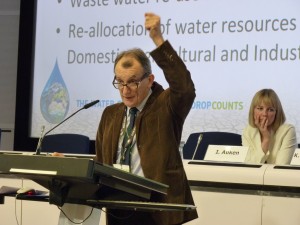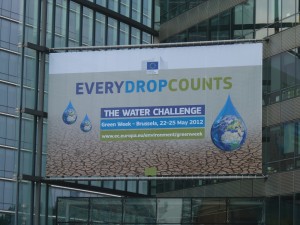Climate adaptation or building resilience (and does it matter?)
Four weeks away from the Rio Summit, the impression I’ve been getting here at Green Week in Brussels has not been one of great optimism on the part of the EU experts involved in the preparations. The EU says it’s going for ambitious targets, but has no reason to assume that others are going to follow suit. EU Director General for environment Karl Falkenberg say’s next week’s meeting in New York for the last round of pre-Rio negotiations will be an “uphill challenge”. The Danish Environment Minister Ida Auken (Denmark currently has EU Presidency) wants to have a global goal on water. We need to take all 3 aspects of sustainability into account, says Auken. The social, environmental and economic impacts. Yes, yes, yes!. Let’s see what will actually come out of Rio.
Climate Commissioner Connie Hedegaard also spoke of “big concern“ about whether Rio can really deliver specifics. She stressed that although it’s not a climate summit, she is pressing for climate to be acknowledged as one of the overarching challenges in sustainable development. And most of the speakers hammer home the point that everything is connected, climate change can’t be seen in isolation just as water, energy or food security have to be taken together. It seems so obvious, but it’s still more easily said than done, is my feeling.
I was irritated by some panelists quibbling over terminology, whether we should be talking about adaptation or about creating resilience. When I pressed them on this, they were all keen to say it doesn’t really matter, the main thing is we get on with it. If that’s the case, why distract attention arguing about distinctions?

Europe needs to be prepared, says Prof. Ghislain de Marsily. Danish Minister Ida Auken listens in the background
One in five Europeans is affected by “water vulnerability” issues. Professor Ghislain de Marsily from Paris University did a great job pointing out that changes in rainfall distribution will not just affect traditionally dry areas. He had some interesting slides on how the Seine could change in Paris.
The problem is of course that it’s much harder to predict how climate change will affect individual regions and on what time scale. But the consensus is we have to take measures now to make sure we are not surprised by worst-case scenarios. This reminds me of a discussion we had at the Potsdam Institute for Climate Impact Research a few weeks ago. The experts there – scientists and insurance experts – were stressing the need to be prepared for the worst case. The EU climate adaptation chief Rosario Bento Pais and other members of a panel on climate adaptation here were in consensus that it makes economic sense to take precautions now. It may seem expensive at the time, but will probably save far higher costs in the long run. The Danish Environment Minister Ida Auken and others across the different sessions stress that the economic crisis should not be an excuse for inaction on what she calls the resources crisis. “The Green Economy is the only way”. Indeed, but it most of the headlines don’t reflect that. This transition is a long process and climate change is happening fast.
















